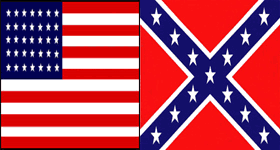 |
Civil War Battles |
|
State War Records |
| AL - AK - AZ - AR - CA - CO - CT - DE - FL - GA - HI - ID - IL - IN - IA - KS - KY - LA - MA - MD - ME - MI - MN - MS - MO - MT - NE - NV - NH - NJ - NM - NY - NC - ND - OH - OK - OR - PA - RI - SC - SD - TN - TX - UT - VT - VA - WA - WV - WI - WY |
The Battle of Todd's Tavern
May 7-8, 1864 in Todds Tavern, Spotsylvania County, Virginia
 |
|||||||||||||||||||||
|
On May 4, 1864, Lieutenant General Ulysses S. Grant led Major General George G. Meade's Union Army of the Potomac across the Rapidan River into the tangles of the Wilderness. Robert E. Lee attacked him there, and in two days of heavy fighting Grant had both flanks turned and took more than 17,000 casualties. Rather than retreat, he issued orders on May 7 for a night march to Spotsylvania Court House, the next stop on the road to Richmond. To get there, his cavalry would first have to clear Confederate cavalry from the Brock Road. This would lead to some of the most intense and important cavalry fighting of war around a country crossroads called Todd's Tavern.
Major General Phillip H. Sheridan commanded the Union army's cavalry. Sheridan had held Todd's Tavern during the Battle of the Wilderness, but had withdrawn his horsemen toward Chancellorsville on the night of May 6th, allowing Major General Fitzhugh Lee's Confederates to reoccupy the intersection. Lee's men occupied and strengthened trenches abandoned by Sheridan near the tavern.
Grant's plans to march the army to Spotsylvania required Sheridan to retake Todd's Tavern from Fitz Lee. Sheridan assigned Major Generals Wesley Merritt's and David M. Gregg's divisions to the task. While Merritt advanced south from Catharine Furnace to clear the Brock Road, Gregg would leave his camp at the Aldrich Farm and push west up the Catharpin Road. The two would meet at Todd's Tavern. Once the crossroads was in their hands, Gregg would continue west on the Catharpin Road and seize Corbin's Bridge over the Po River.
Sheridan's plan worked to perfection. Fitz Lee met Merritt's advance about 0.75 mile a mile north of Todd's Tavern, but when Gregg appeared on his flank, at Piney Branch Church, he abandoned the crossroads and retreat down the Brock Road toward Spotsylvania. Gregg occupied Todd's Tavern about noon then pushed on to Corbin's Bridge. A mile west of the tavern he ran into Brigadier General Thomas L. Rosser, who commanded a Confederate cavalry brigade in Major General Wade Hampton's division. With Federal repeating rifles blazing away and supported by the fire of two cannon, Gregg forced Rosser's brigade back to Corbin's Bridge. He later withdrew to the tavern when two other brigades of Hampton's division came to Rosser's support.
Merritt meanwhile pursued Fitz Lee down the Brock Road toward Spotsylvania. Two miles south of Todd's Tavern, at the junction of the Piney Branch Road, Lee halted and threw up logworks. Merritt attacked him there in the late afternoon on the Brock Road, while Brigadier General Henry E. Davies brigade of Gregg's division advanced against Lee's right via the Piney Branch Road. This fight between Lee and Merritt developed into the deadliest phase of the battle. The 1st New York Dragoons alone lost 91 men in the action, the highest loss of any cavalry regiment in a single engagement during the war. At one point in the battle, the Confederate logworks caught fire, but the soldiers simply shot at one another through the flames. Merritt finally captured the logworks late in the day, but as night drew on he withdrew his division towards Todd's Tavern enabling Lee to reoccupy them.
That night, Meade pulled his army out of its trenches in the Wilderness and began marching down the Brock Road toward Spotsylvania Court House. Major General Gouverneur K. Warren's Fifth Corps led the march. Meade ordered Sheridan to clear the road all the way to Spotsylvania, but the orders miscarried, and when Meade reached Todd's Tavern about midnight, he found Gregg's troops in bivouac there. He angrily ordered Merritt to finish clearing the road to Spotsylvania while Gregg pushed out the Catharpin Road to to Corbin's Bridge to protect the army's right flank. Merritt again found Fitz Lee's division still blocking the road. Lee had felled trees across the road to hinder the Union army's advance, and his troops shot at the Federals as they tried to pull them out of the way. Impatient with Merritt's slow progress, Warren at dawn ordered Major General John C. Robinson's infantry division to the front. Robinson's foot soldiers pushed Fitz Lee's troopers back across the Alsop Farm clearing to a slight ridge later called Laurel Hill, less than two miles from the Court House. Lee's men threw down fence rails along the low, wooded crest and again prepared to contest the Union advance. Robinson confidently advanced to attack them. As he did so, two Confederate infantry brigades of Major General Richard H. Anderson's First Corps--the vanguard of Lee's army--came running up from the rear and joined Lee's men along the ridge, and together they hurled the Federals back in confusion. Repeated attacks by Warren failed to crack the Confederate line. Thanks to tenacious fighting on the part of Fitzhugh Lee's troopers, the Southerners had won the race to Spotsylvania.
